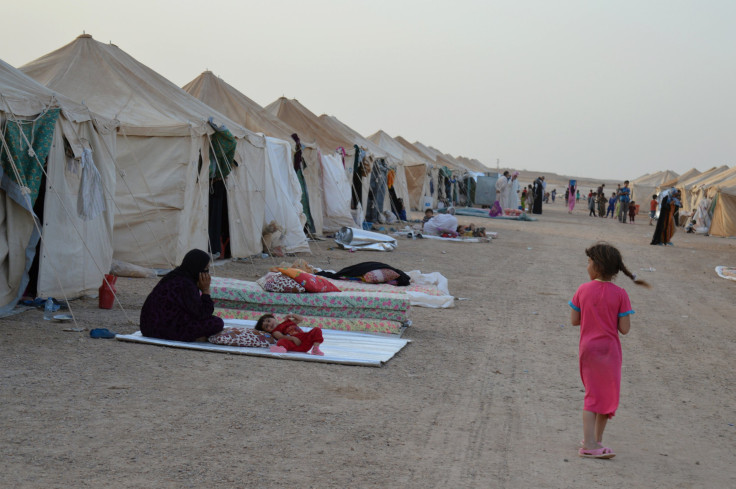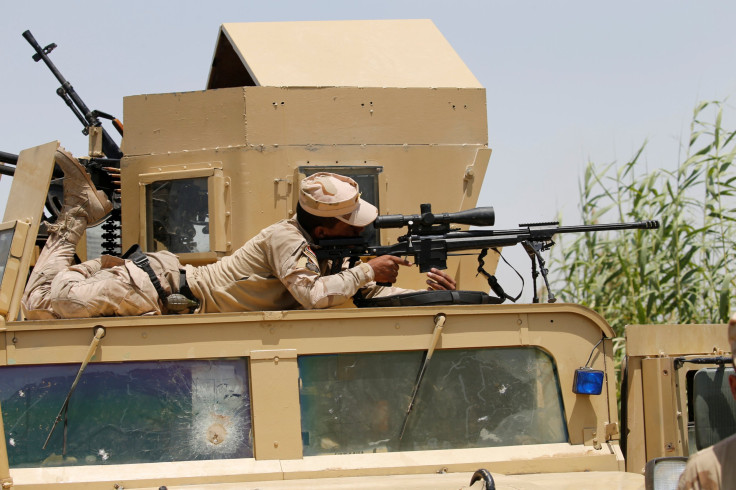Fear That ISIS Militants Could Slip Into Baghdad Is Hindering Efforts To Help Refugees

Tens of thousands of Iraqis are now trapped just outside the city of Fallujah. While fasting for Ramadan, they live in overcrowded tents and sleep on mattresses on the ground in 120-degree heat. They could find safety and shelter in the capital, 30 miles away across the Bzebiz Bridge. But the military won't let them go: Even though the refugees were fleeing the Islamic State group, Iraqi officials fear that some ISIS militants have infiltrated the crowd in an attempt to slip into Baghdad.
The 83,000 desperate people, displaced by last week's battle between ISIS fighters and Iraqi counterterrorism forces in Fallujah, are only the country's latest internal refugees. In Anbar province alone there were already more than 75,000 people huddled in camps in Khalidiyah, Habbaniyah and Ameriyat al Fallujah. Aid organizations are forced to resettle people in camps that are already at capacity, severely limiting resources.
Meanwhile, the battle for Fallujah rages on. Humanitarian organizations say there could be thousands of people still trapped in the city. As the military pushes further into the city in an attempt to completely clear the area, the United Nations says it expects more people to flee.

Karl Schembri with the Norwegian Refugee Council, a humanitarian organization that does extensive work in Anbar, described the situation in Fallujah to reporters as "catastrophic."
More than a quarter of the children in Anbar, a vast area of western Iraq, are chronically malnourished, according to the United Nations. Food and medical aid is often blocked from crossing the bridge to the camps. Thousands of Iraqis have complained to the U.N. that they are not allowed to leave the province, even for medical treatment or to join family in Baghdad.
With residents from the largely Sunni province considered a security threat by the Shiite-dominated Baghdad government, access is severely restricted and soldiers have separated men and boys from their families for additional screening. Aid convoys need clearance from the central government, which is currently engulfed by political infighting and frequent protests. The government sometimes takes three or four days to approve the opening of the Bzebiz Bridge.
With a lack of U.N. oversight, people are reporting that the Shiite paramilitary groups operating outside Fallujah are targeting the refugees fleeing ISIS.
“There are extremely distressing, credible reports that some people who survive the terrifying experience of escaping from ISIL [ISIS], then face severe physical abuse once they reach the other side,” U.N. High Commissioner for Human Rights Zeid bin Ra'ad Al Hussein said in a news release earlier this month.
International standards of humanitarian aid state that the host government is in charge of resettling internally displaced people. It is responsible for finding space to build tents and distributing funds it receives from foreign governments. Finding land for new camps would be a challenge even if the Baghdad government were not preoccupied by the fight against ISIS. Many Iraqis fear an influx of people who have lived under the Islamic State group, worrying that they may be Islamic State loyalists.
Humanitarian funding, meanwhile, is running out and several initiatives such as food distribution programs may soon run out of money. The U.S. State Department has announced an additional $20 million contribution to the U.N. in response to appeals for Fallujah. But that aid won't reach Iraq for several more months.
“We are using all available resources, but we are running out of funds. The international community has invested so much militarily to defeat ISIS," said Lise Grande, the U.N. humanitarian coordinator for Iraq, in a statement. "We need to do so much more to help the victims. We cannot let these people down."
© Copyright IBTimes 2024. All rights reserved.











